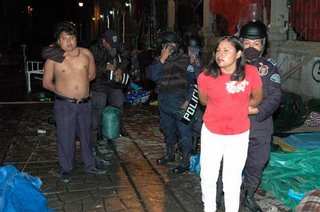The Anti-Citizen State
Upon becoming a member of a society, John Locke tells us, the power that a person exercised in the state of nature must be given up to a certain extent so that the society as a whole can achieve its goals. Presumably, the power that people use against one another in the state of nature causes such discomfort and danger that forfeiting freedom and sovereignty to roost in the protective nest of a society seems like a fair trade.
However, as Locke describes in section 145, the commonwealth itself is a very different animal to the citizens that compose its body. Whereas those living within the commonwealth are discrete individuals accountable to the law, the unit that collectively represents them to the rest of humanity, the commonwealth, remains in the state of nature that the citizens existed in previous to joining the society.
This can easily be applied in a modern context where institutions have a different set of moral standards and legal prerogatives than those that they impose on people. States, like the pre-societal people that Locke describes, engage in ruthlessly self-interested activities that cause disorder and bloodshed. We created states that are different to us; citizens give up total sovereignty for the greater unity and prosperity of the state, states maintain total sovereignty at the expense of the greater unity and prosperity of the world. Citizens are the complicit and obedient organs that operate in an anti-citizen state.
Neither “world government” nor “global citizenship” seem to me like useful ideas. I think that participation in international political bodies and regional economic blocs should be increased, but existing favouritism and exceptionalism have to be overcome. But that’s beside the point. The point is that though Locke describes a noble humanity that unites under a set of laws based on reason, their collective political unit is one that is still in the state of nature, characterized by violence and disorder fueled by self-interest.
tag: last301
However, as Locke describes in section 145, the commonwealth itself is a very different animal to the citizens that compose its body. Whereas those living within the commonwealth are discrete individuals accountable to the law, the unit that collectively represents them to the rest of humanity, the commonwealth, remains in the state of nature that the citizens existed in previous to joining the society.
This can easily be applied in a modern context where institutions have a different set of moral standards and legal prerogatives than those that they impose on people. States, like the pre-societal people that Locke describes, engage in ruthlessly self-interested activities that cause disorder and bloodshed. We created states that are different to us; citizens give up total sovereignty for the greater unity and prosperity of the state, states maintain total sovereignty at the expense of the greater unity and prosperity of the world. Citizens are the complicit and obedient organs that operate in an anti-citizen state.
Neither “world government” nor “global citizenship” seem to me like useful ideas. I think that participation in international political bodies and regional economic blocs should be increased, but existing favouritism and exceptionalism have to be overcome. But that’s beside the point. The point is that though Locke describes a noble humanity that unites under a set of laws based on reason, their collective political unit is one that is still in the state of nature, characterized by violence and disorder fueled by self-interest.
tag: last301

